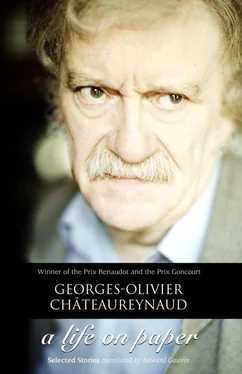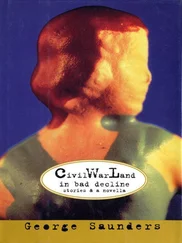Georges-Olivier Chateaureynaud - A Life on Paper - Stories
Здесь есть возможность читать онлайн «Georges-Olivier Chateaureynaud - A Life on Paper - Stories» весь текст электронной книги совершенно бесплатно (целиком полную версию без сокращений). В некоторых случаях можно слушать аудио, скачать через торрент в формате fb2 и присутствует краткое содержание. Год выпуска: 2010, Жанр: Современная проза, на английском языке. Описание произведения, (предисловие) а так же отзывы посетителей доступны на портале библиотеки ЛибКат.
- Название:A Life on Paper: Stories
- Автор:
- Жанр:
- Год:2010
- ISBN:нет данных
- Рейтинг книги:4 / 5. Голосов: 1
-
Избранное:Добавить в избранное
- Отзывы:
-
Ваша оценка:
- 80
- 1
- 2
- 3
- 4
- 5
A Life on Paper: Stories: краткое содержание, описание и аннотация
Предлагаем к чтению аннотацию, описание, краткое содержание или предисловие (зависит от того, что написал сам автор книги «A Life on Paper: Stories»). Если вы не нашли необходимую информацию о книге — напишите в комментариях, мы постараемся отыскать её.
A Life on Paper
A Life on Paper: Stories — читать онлайн бесплатно полную книгу (весь текст) целиком
Ниже представлен текст книги, разбитый по страницам. Система сохранения места последней прочитанной страницы, позволяет с удобством читать онлайн бесплатно книгу «A Life on Paper: Stories», без необходимости каждый раз заново искать на чём Вы остановились. Поставьте закладку, и сможете в любой момент перейти на страницу, на которой закончили чтение.
Интервал:
Закладка:
When, on his return, he found the pavilion leveled and the linden felled, he flew into a royal fury. He summoned the palace architect and demanded he explain himself. In a quavering voice, the man pleaded for his life. Wasn't it his duty, foreseeing as he did His Majesty's victory and the treasure he would certainly bring back, to enlarge the palace storehouses? And since that courtyard, forgotten by one and all, with its crumbling pavilion and its ailing linden, adjoined one of the storerooms already overflowing with the spoils of earlier wars…
King Guita saw that the architect believed himself to have acted rightly, and so for a time spared his life. But a feeling of irreparable loss overcame him whenever his thoughts returned to the coolness of tile beneath his knees and the scent a light wind from the tapering leaves wafted toward him. Then it seemed that he had lost much more than a city, more even than a province: something like his kingdom's secret heart. One day, when this feeling assailed him with greater force than usual, his gaze settled on the architect. He frowned, and had him put to death.
He ordered the man's successor to erect the pavilion once more in a faithfully recreated courtyard, and to have a tree, like the first in every way, transplanted there. When all was done at last, he went one night and sat alone on the wooden bench. And lingered there, sniffing the air in vain. The tree's very odor seemed foreign and unnatural to him. When the light had grown so dim that the mosaic might no longer be made out, he let himself slip from the bench onto the floor, onto the very spot where he had spent so many peaceful hours as a child. He ran his fingers over the mosaic's surface without finding the same terrain of tiny ridges, the same infinitesimal fissures, the same traces of wear his fingertips remembered. The pitiless ruler wept. He who had never before trembled was terrified. The pavilion and the linden, so lately but a memory, were a reality once more. Suddenly the king doubted his powers of recall, his own name, his very kingship. And if he were not King Guita, who was he, by God, and what was he doing in this strange palace on this hostile night?
To ensure he might never again suffer so nightmarish a feeling, he forbade henceforth any change, be it even in the tiniest detail, to the city. It could of course grow, and maintaining it would always be a sacred duty, but what already was would forever so remain, enjoying inalienable rights and total precedence over what was yet to come, over all the unformed and inchoate future.
The king's character and project seemed to capture the imaginations of his subjects and their children, as for many years, almost unto the present day, his will was done. Today, few dare venture into the city's distant heart where, on days of high wind, the last buildings from the Founder's era finish breaking apart, waves subsiding in a sea of rubble. Abandoned, too, are the plans to preserve the knotted and dangerous maze of medieval alleys. We have our people's long allegiance to the folly of a single man to thank for this our dwelling place: the sole existing urban order aimed at totality, a concentric and cumulative keep, time and the city turning ideally round a memory like a wheel around an axle.
Lozere, December 1990
Another Story
 or anyone who feels deeply about property, there's nothing like owning an island. Nothing comes closer to pure possession; nothing else goes quite so far in confirming the illusion of sovereign, absolute selfhood. When a man has almost everything, buying an island is the next step.
or anyone who feels deeply about property, there's nothing like owning an island. Nothing comes closer to pure possession; nothing else goes quite so far in confirming the illusion of sovereign, absolute selfhood. When a man has almost everything, buying an island is the next step.
That's what Erwin Laurencais did. To sniff out where the rich get their riches, you have to be one of them, or else few things seem so vague and nebulous as money. You see it all around, bathing those who have it in its light and warmth, filling and transfiguring them… And yet the average man, who manages food, clothes, shelter, warmth, and transport without undue worry or exertion, will sometimes want a slightly clearer idea of the gulf between himself and the truly wealthy. A pointless, even spiteful, curiosity. Just as well, then, that money isn't my subject. The Laurencais fortune plays but an incidental part in this tale. Erwin Laurencais was so rich he'd bought himself no tiny islet, but a good-sized island.
I went there at his invitation-by air, to my acute dismay. You'll find no creature more earthbound than I. I'm so naturally averse to flying I usually give up on any trip that can't be made by road, rail, or sea-but the area around the island happened to be so dangerous the only way in was by plane or helicopter. For Laurencais, and for his legend, I made an exception. The money that pours into his hands drives him to undertake a certain number of secretly necessary things almost no one else on earth could see to completion. A hunch about these things is essential to understanding the great eccentric billionaires… For a billionaire (I believe the word falls short), Laurencais was unique in this respect: he wasn't satisfied with owning the most expensive things or mingling with the most famous people. He loved surrounding himself with what was least known as well, objects and people alike. I found his invitation flattering. I am a writer-a French writer, to boot-two qualities worth less than nothing these days. I was astounded that a Laurencais (despite the sound of his surname, a Venezuelan) wished to make my acquaintance.
Laurencais' island is beautiful, in its way-thanks to him. It was once a picturesque rock, an actual desert isle: pretty mountains, but no shelter, no beach, no fresh water, and as a result, stunted vegetation. Laurencais' money changed everything. Planes brought in soil for gardens and meadows now irrigated by processed seawater. For private use, Laurencais built a desalination plant that would've been enough for the average emirate.
On the island's most stunning side, where Laurencais had chosen to build his palace, a steep and sudden drop lay between the coast and the line of reefs barring the seaward approach. The tycoon could have flattened the coast with dynamite and brought in all the sand he wanted, but nothing in the world would have kept the ocean from licking the shore clean. Never mind, then-Laurencais had a second shoreline, set back from the first, designed, dug, and shaped to his liking. Beside an artificial lagoon, a landscaped beach secured the master of the house and his guests all the charms the site supposedly refused them. The sand was so fine each grain seemed handpicked. Nearby, the birds that sang above their heads were, like the trees where they dwelled, chosen from a catalogue. So were the people… but I'll get back to that.
I mentioned a palace; don't go picturing alabaster columns, marble staircases, and golden roofs. In Laurencais' jaded gaze, luxury-the spirit of luxury-had left materials behind to seek refuge in form. He wasn't completely indifferent to materials, of course: for the most part his palace was made of solid mahogany and pristinely white, freshly cast concrete. Yet with this bias in mind, the architect Benito Guardicci (yes, a relative of the famous artisan glassmaker) was able to work wonders. The residence he created for Laurencais was beautiful without being reminiscent of any other. Its beauty was for those who lived there. As the days went by, you became aware of the balance, the harmony emanating from the rectangular structures amid the rocks and the greenery. At first, they seemed scattered haphazardly about the lagoon, itself irregularly shaped. You had to stay there a while to realize that Guardicci had conceived it all with a rich man in mind, for Laurencais and his select guests, in accordance with the truth of the setting: a world without neighbors, prying eyes, or unwanted onlookers.
Читать дальшеИнтервал:
Закладка:
Похожие книги на «A Life on Paper: Stories»
Представляем Вашему вниманию похожие книги на «A Life on Paper: Stories» списком для выбора. Мы отобрали схожую по названию и смыслу литературу в надежде предоставить читателям больше вариантов отыскать новые, интересные, ещё непрочитанные произведения.
Обсуждение, отзывы о книге «A Life on Paper: Stories» и просто собственные мнения читателей. Оставьте ваши комментарии, напишите, что Вы думаете о произведении, его смысле или главных героях. Укажите что конкретно понравилось, а что нет, и почему Вы так считаете.












